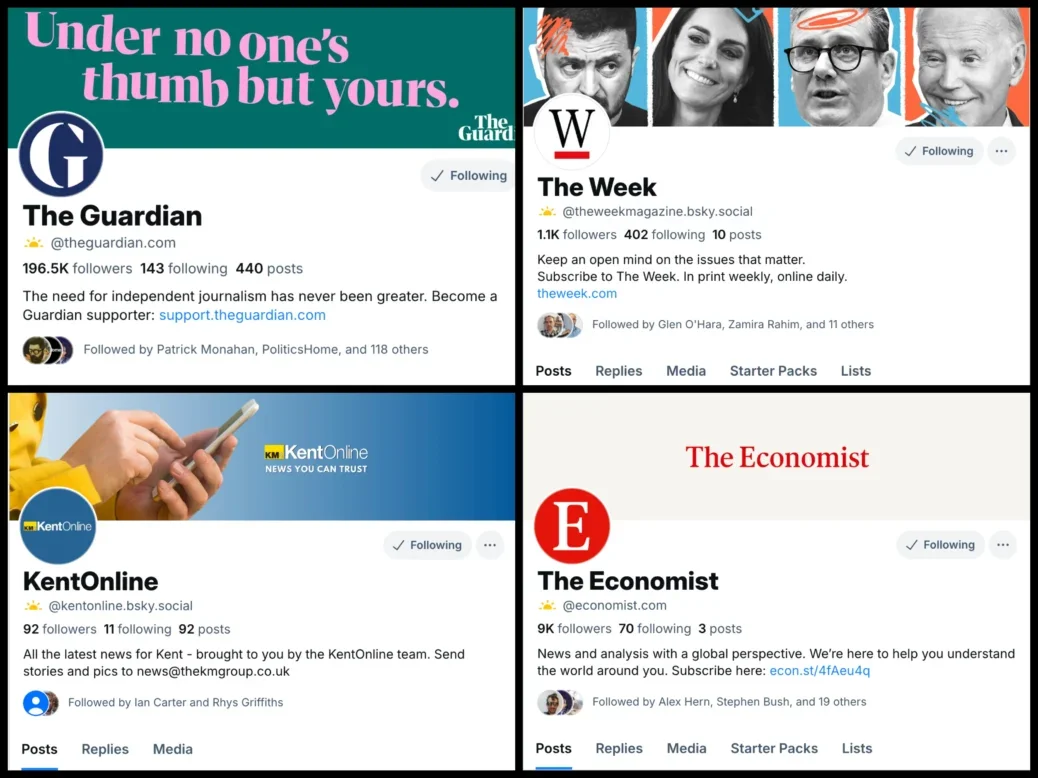
A wave of news publishers have arrived on Bluesky in recent days, following audiences and journalists departing X/Twitter.
Days after announcing it was leaving X, The Guardian has become one of a flurry of news publishers to set up an account on the rival microblogging platform.
A significant uptick in account registrations since the US election has prompted a wave of new journalists and publishers to start posting to Bluesky over the past week. As of midday Tuesday it had 20 million accounts, up from 16 million before the weekend.
There has been a gradual flow of users from X toward rival platforms since Elon Musk bought the network in October 2022, but the influx has accelerated since the tech entrepreneur became closely involved with Donald Trump’s re-election campaign and then his fledgling second administration. Meta platform Threads, which has signalled an intent not to get entangled with the news industry, appears not to have benefitted from the exodus in the same way as Bluesky.
Publications including The Economist, The Week, the i, Kent Online and ITV News have joined Bluesky in the past week, and previously dormant accounts from the likes of Politico, Semafor, The Lead, Tortoise and Pink News have resumed activity. The National Union of Journalists has also set up, as well as press regulator IPSO.
All of the above have either verified they are official accounts by making their handle their website address, or Press Gazette has confirmed they are official with the publishers themselves.
Although the publications appear to have been joined by numerous big names in journalism, including BBC presenter Matt Chorley and Guardian editor Katharine Viner, few of them have verified their identities. One who has is Sky News lead politics presenter Sophy Ridge, who observed that she appears to be getting more engagement on Bluesky than on X despite having a far smaller following.
Charlie Baker, editor of quarterly print magazine The Fence, agreed that Bluesky engagement has been good, telling Press Gazette: “The Fence got 4,000 followers over the weekend, and we’re enjoying a very high level of engagement. It’s a lot of fun and long may that continue.”
Josh Billinson, the senior social media editor at Semafor, posted on Monday that he had recommenced the publisher’s activity on Bluesky a week earlier “and it already has more followers than the Threads account I’ve been posting to consistently for over a year”.
Where is news publisher Bluesky follower growth coming from?
Bluesky does not include algorithmic recommendations as a standard feature of user timelines. As a result, so-called starter packs — lists created by users of accounts, usually grouped around a single theme and who can all be followed at a single click — have been the leading driver of rapid account growth.
Freelance Chaminda Jayanetti wrote last week that “with warp speed I now have more followers here than on Twitter, which (genuinely) has very little to do with my posts here but really shows the effect of starter packs”.
Getting into a widely-used starter pack in the first place can be another matter, however. Several news organisations have been creating their own, allowing users to follow all of their journalists at once, and a third-party Bluesky directory makes it possible to search for packs on specific themes.
As well as the starter packs, Press Gazette has written previously about a feed containing posts from verified news providers which is maintained by Financial Times data journalism engineer Ændra Rininsland. She said on Monday the feed was receiving one million requests a day. Only news outlets that have linked their handle to their domain name may apply for inclusion in the feed.
[Read more: Twitter alternative? News publishers see potential in Bluesky]
Journalists sign open letter declaring X/Twitter ‘no longer a useful tool’ for reporting
In the past week a group of more than 30 journalists ut their names to an open letter declaring X to be “no longer a useful tool” for reporting.
The signatories include Guardian North of England correspondent Robyn Vinter, investigative journalist Peter Geoghegan, Foreign Press Association London director Deborah Bonetti and former Guardian special correspondent Nick Davies.
The letter, organised by Byline Times chief reporter Josiah Mortimer, said Twitter “played an important role in shaping many of our careers” and that “it was, for a long time, the place to be for UK politics”.
But, it added, “we believe that time is over now”.
The Elon Musk-owned platform has long been a useful way for journalists to find stories, verify information and contact sources, as well as to distribute their work and meet peers.
However the signatories argued that under Musk “feeds have become less useful. Engagement has plummeted, except for those who will pay. Replies gain traction not through merit, but through the corrupted blue-tick system.
“We have seen hate speech and abuse deliberately dialled up and amplified, boosted not just by the algorithm, but by the owner himself… It is no longer a useful tool for objective reporting, but a weapon being wielded by a narrowing ideological set.”
The letter adds that in lieu of X, “we are all putting the majority of our efforts into building more constructive online spaces elsewhere”, in particular Bluesky.
The letter and the full list of signatories can be viewed here.
Email pged@pressgazette.co.uk to point out mistakes, provide story tips or send in a letter for publication on our "Letters Page" blog
